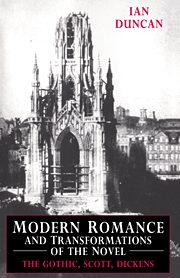1 - The culture of Gothic
Published online by Cambridge University Press: 04 May 2010
Summary
Who cannot be crushed with a plot?
(Shakespeare, All's Well that Ends Well, Act IV, sc. 3)The eighteenth-century Gothic novel is the first modern British fiction to identify itself as a distinct kind under the name of ‘romance’. The very first of all appeared as an antiquarian forgery: the translation, by one William Marshal, Gent., of a sixteenth-century Italian story by Onuphrio Muralto. In the preface to the second edition of The Castle of Otranto (1765), Horace Walpole admitted the hoax and explained that he had attempted ‘to blend the two kinds of Romance, the ancient and the modern’. By ‘romance’ Walpole meant fiction in the vernacular languages. The distinction between kinds is one between historical periods, roughly marked by the revolutionary settlement of 1689. A generation later, however, Ann Radcliffe and Matthew Lewis expanded Walpole's repertoire of figures and proclaimed as ‘romance’ a fiction apart from modern life. The opening of Radcliffe's Romance of the Forest (1791) announces a turbulent crossing of familiar thresholds:
Such elegance and apparent refinement, contrasted with the desolation of the house, and the savage manners of its inhabitants, seemed to him like a romance of imagination, rather than an occurrence of real life.
By the 1790s, the Gothic romance is a dominant literary genre that marks a decisive alienation of novelistic representation from its official province, ‘real life and manners, and the time in which it is written’. It does not situate itself outside that province, however, so much as on its border, as if entranced in the motion of crossing.
- Type
- Chapter
- Information
- Modern Romance and Transformations of the NovelThe Gothic, Scott, Dickens, pp. 20 - 50Publisher: Cambridge University PressPrint publication year: 1992

